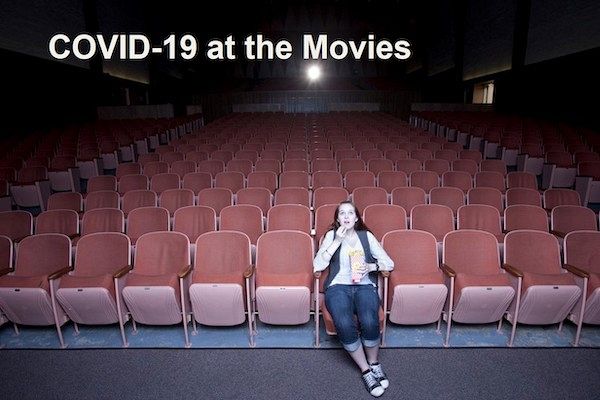As COVID-19 shuts down festivals and mass gatherings around the world, entertainment editor John Turnbull considers the impact of coronavirus on movies and the cinema industry.
ON MONDAY MARCH 9, the Italian Government issued a quarantine edict closing the 1,200 cinemas across the country and halting all film production until April 3. This shutdown was expanded from the previous ban issued a fortnight ago, closing cinemas in the five quarantined regions.
Of course, the mandatory quarantine has also closed churches, restaurants and all shops except pharmacies and grocery stores, so the problem is a lot bigger than people not being able to go to the movies.
Okay, so now it’s a pandemic
Over recent weeks Governments and health officials around the world have been going out of their way to avoid using the word "pandemic", based on the not-unreasonable assumption that the official announcement of a pandemic may cause panic and unreasonable behaviour like toilet paper hoarding. Unfortunately, it seems many governments have used this as an excuse to do a half-arsed job — a critique that has been aimed at the United States, among many others.
For better or worse, the World Health Organisation (WHO) made the call on March 11, when WHO Director-General Tedros Adhanom Ghebreyesus announced:
WHO has been assessing this outbreak around the clock and we are deeply concerned both by the alarming levels of spread and severity, and by the alarming levels of inaction. We have therefore made the assessment that COVID-19 can be characterized as a pandemic.
Pandemic is not a word to use lightly or carelessly. It is a word that, if misused, can cause unreasonable fear, or unjustified acceptance that the fight is over, leading to unnecessary suffering and death.
Describing the situation as a pandemic does not change WHO’s assessment of the threat posed by this virus. It doesn’t change what WHO is doing, and it doesn’t change what countries should do.
We have never before seen a pandemic sparked by a coronavirus. This is the first pandemic caused by a coronavirus. And we have never before seen a pandemic that can be controlled, at the same time.
Pandemics in the movies
While we’re talking about the impact of COVID-19, it’s worth taking a moment to look at how major virus outbreaks have been portrayed on the big screen over the years.
In the shadow of WWII, the memory of chemical weapons drove early pandemic movies like the 1950 film Panic in the Streets where a doctor (Richard Widmark), a cop and his wife try to track down Patient Zero in a pneumonic plague outbreak. Directed by Elia Kazan (A Streetcar Named Desire), it’s big on melodrama and light on science.
Things didn’t get much better in the 70s as gun nut Charlton Heston gurned his way through a post-apocalyptic wasteland where a virus has turned humanity into zombie-like creatures and pandemics became the go-to origin story for zombie movies for the next half-century (28 Days Later, World War Z).
Things got a little serious in the 90s, as Bruce Willis time travelled to prevent a pandemic in 12 Monkeys and Morgan Freeman made cute little monkeys seem terrifying in Outbreak.
A pandemic-driven wave of infertility provides the backdrop to Alfonso Cuaron’s harrowing Children of Men, made back in the halcyon days of 2006 when the idea of putting migrants in cages seemed dystopian and horrific. Pulling back on the social commentary and focusing on the science right, Steven Soderbergh’s 2011 movie Contagion is terrifying for its plausibility and reinforces just how hard it is to avoid frequently touching your face.
Impact on new films
Dozens of independently financed and produced films premiere every year at the SXSW Festival in Austin, Texas. With the recent cancellation of the music and arts event, filmmakers, musicians and digital creatives are robbed of the opportunity to present their wares to distributors and money-men, along with the opportunity to attend lectures and mentor sessions with directors like Danny Boyle, Robert Rodriguez and Richard Linklater.
As I write this article, the only major theatrical release that has been delayed is the new Bond flick No Time to Die, but there is no doubt that distributors will be looking closely at falling box office revenues as cinemas close across China, Iran, Poland, India, Lebanon, Kuwait and the Czech Republic (the list continues to grow). As I proofread this article, Peter Rabbit 2 joins the club, shifting back from March 19 to September 10, taking a hit on the advertising campaign that has been running for the last couple of weeks.
From a production perspective, everything has been shut down in China, the next Mission Impossible flick has put their Venice shoot on hold and beloved elder statesman Tom Hanks is infected, shutting down production on the new Baz Luhrmann Elvis biopic. Oh well, I guess it’s not all bad…
If there is an upside to cinemas closing their doors, it will give people the chance to check out the multitude of streaming services that have been launched in the years since they had any free time. If you don’t fancy paying for content, ABC iview and SBS On Demand are free, Kanopy is available with a library card and Tubi joins a growing list of ad-supported free streaming platforms.
In all seriousness, while the mainstream media is doing their best to make COVID-19 seem terrifying, it’s certainly worth taking seriously, particularly if you’re older or have existing raspatory issues. Unless you’re symptomatic, it’s not recommended that you wear a mask, specifically because a damp mask can transmit a virus really well.
Oh, and wash your hands.
John Turnbull is Independent Australia's entertainment editor, a writer, balloon pilot and tattoo aficionado.
 This work is licensed under a Creative Commons Attribution-NonCommercial-NoDerivs 3.0 Australia License
This work is licensed under a Creative Commons Attribution-NonCommercial-NoDerivs 3.0 Australia License
Support independent journalism Subscribe to IA.












